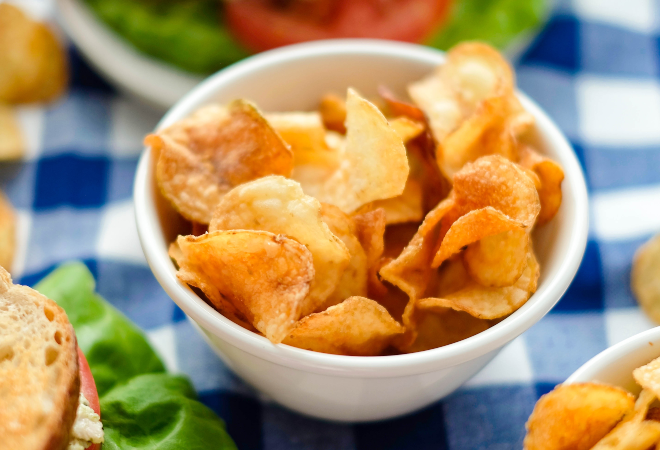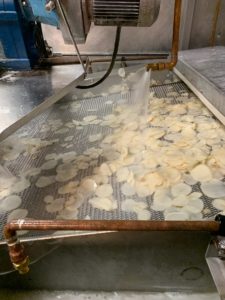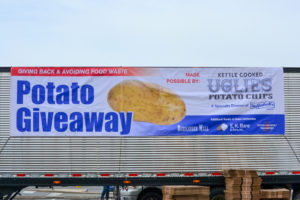
Chip makers Better Made, Uglies finding ways to cut down on food waste
As sustainability continues to grab a larger share of public attention, food producers are meeting the challenge by coming up with new ways to get more out of available resources.
Potatoes, one of the most processed vegetables in the world, emit starch when cooked. When processing a vast amount, like at a potato chip factory, all that starch has to go somewhere.
At Better Made Snack Foods, which has been located on Detroit’s east side since 1940, that starch used to go into the city’s sewer system. In the early part of the 21st century, things started changing, however.

“The Great Lakes Water Authority started looking at what corporations were putting into the sewers, since they had to remove all that stuff,” said Phil Gusmano, vice president of Better Made and a 25-year employee of the company. “They’d look at what you were putting in and then charge you accordingly. Well, our water bills kept going up — more accurately, our sewage bills — so we had to figure out ways to mitigate those.”
Better Made began scouting around for a centrifuge system to remove the starch from wastewater before it exited the factory back into the water system.
“Starch is actually really finicky as both a liquid and a solid,” Gusmano said. “It’s a complicated product to remove from water. If it sits too long, it turns to a solid. … It has a tendency when it gets hard to almost get like cement; it’s really hard to clean out of places if it’s not done correctly.” Gusmano added that moving it too quickly also leads to it being difficult to handle.
“We kind of knew we needed a centrifuge, so we just contacted different companies,” he said. “We would send them small samples of the wastewater for proof of concept and they were able to recommend which would work for us.”
The system went into place “about eight years ago,” Gusmano said. Today, it removes roughly 6,000 pounds of starch daily.
While success was found on removing starch — and therefore mitigating sewage bills — the chip maker still had to dispose of it, but that’s where things really got good for Better Made.
The excess starch from Better Made’s operation actually proved to be quite desirable for the select companies that utilize starch for other purposes.
“They actually use it as a coating on potatoes to give them that crispiness, like those seasoned fries or crispy fries, that’s actually potato starch that’s been applied to the outside,” Gusmano said.
Most of the starch is sold to producers of other potato food products, but in recent years Better Made has developed a partnership with MichiGrain, a Lansing, Michigan-based distillery that uses the starch to make potato vodka.
While rising costs sort of forced the company’s hand to alter its production system, the end result has been a good one.
“It’s a really great way of taking something that was waste and turning it into a revenue generator,” Gusmano said. “It’s a great opportunity to keep things out of landfills and goes to that green manufacturing line of thinking: do more with less and help the environment while doing it.”
Perfectly imperfect potato chips
Not only do consumers want visually pleasing produce, the U.S. Department of Agriculture has long had grades and standards that food producers have had to meet for approval to reach the market. Below-grade produce is a major cause for food waste, noted Morgan Santoro of Diffenbach’s Potato Chips in Eastern Pennsylvania.

“Each year more than six billion pounds of produce goes unharvested or unsold for aesthetic reasons,” Santoro said. “Too much of ugly produce goes unused and is plowed back into the earth or ends up in landfills.”
Mark Diffenbach, who founded the company in 1964, recognized early on that less-than-desirable produce was not just a waste of edible produce, but a hardship for the farmer who grew it.
“There were plenty of times we would receive potatoes that were less than perfect. They were still useful potatoes but had cosmetic imperfections that the grading standards would deem ugly,” Santoro said. “Instead of throwing them away, we instead used them to make chips that were sold only in our on-property factory store.
“Our local customers loved them, so we started introducing the concept at regional shows here in Pennsylvania.”
The concept so resonated with local buyers, Diffenbach’s started a brand that consists solely of imperfect potatoes, which they sagely named Uglies. It launched in 2017. The first full year of production, Uglies processed about 680,000 pounds of potatoes. This year, they’ll surpass five million pounds in all. The standard 6-ounce bags are sold in regional and national supermarket chains, while smaller 1- and 2-ounce sizes are generally sold to the foodservice sector.
The processing system for Uglies is largely the same as for Diffenbach’s standard brand. The major difference is the threshold for the optical sorting machines. Uglies, obviously, has much looser sorting parameters than the other brands. Santoro said even potatoes deemed too ugly for Uglies still do not go to waste, they’re distributed to local farmers to use as animal feed.
Uglies is an example of more consumers recognizing the role “ugly,” yet edible produce plays in global waste, Santoro said.

“The upcycled food movement isn’t going anywhere. In fact, it is only gaining traction,” Santoro said. “More than ever before, consumers are aware of the impacts of food production. Brands, businesses and manufacturers are under extreme pressure to re-evaluate their environmental impact. We believe Uglies is ahead of the curve.”
Outreach also is a big part of Uglies’ model. Last spring, when COVID restrictions went into place and processors began turning away potatoes, Uglies sponsored a “Great Potato Giveaway,” which saved 40,000 pounds of potatoes from going to waste.
“We believe we’re succeeding in giving the consumer what they want, and a brand they can feel good about purchasing, from helping farmers by saving potatoes to donating 10% of our sales to an international organization that helps underprivileged children,” Santoro said.







